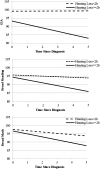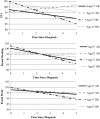Examination of risk factors for intellectual and academic outcomes following treatment for pediatric medulloblastoma
- PMID: 24497405
- PMCID: PMC4096173
- DOI: 10.1093/neuonc/nou006
Examination of risk factors for intellectual and academic outcomes following treatment for pediatric medulloblastoma
Abstract
Background: The aim of this study was to prospectively examine the effects of hearing loss and posterior fossa syndrome (PFS), in addition to age at diagnosis and disease risk status, on change in intellectual and academic outcomes following diagnosis and treatment in a large sample of medulloblastoma patients.
Methods: Data from at least 2 cognitive and academic assessments were available from 165 patients (ages 3-21 years) treated with surgery, risk-adapted craniospinal irradiation, and 4 courses of chemotherapy with stem cell support. Patients underwent serial evaluation of cognitive and academic functioning from baseline up to 5 years post diagnosis.
Results: Serious hearing loss, PFS, younger age at diagnosis, and high-risk status were all significant risk factors for decline in intellectual and academic skills. Serious hearing loss and PFS independently predicted below-average estimated mean intellectual ability at 5 years post diagnosis. Patients with high-risk medulloblastoma and young age at diagnosis (<7 years) exhibited the largest drop in mean scores for intellectual and academic outcomes.
Conclusions: Despite a significant decline over time, intellectual and academic outcomes remained within the average range at 5 years post diagnosis for the majority of patients. Future studies should determine if scores remain within the average range at time points further out from treatment. Patients at heightened risk should be closely monitored and provided with recommendations for appropriate interventions.
Keywords: academic; cognitive; hearing; medulloblastoma; posterior fossa syndrome.
© The Author(s) 2014. Published by Oxford University Press on behalf of the Society for Neuro-Oncology. All rights reserved. For permissions, please e-mail: journals.permissions@oup.com.
Figures
References
-
- Robinson KE, Kuttesch JF, Champion JE, et al. A quantitative meta-analysis of neurocognitive sequelae in survivors of pediatric brain tumors. Pediatr Blood Cancer. 2010;55(3):525–531. - PubMed
-
- Robinson KE, Fraley CE, Pearson MM, et al. Neurocognitive late effects of pediatric brain tumors of the posterior fossa: a quantitative review. J Int Neuropsychol Soc. 2013;19(1):44–53. - PubMed
-
- Gurney JG, Severson RK, Davis S, et al. Incidence of cancer in children in the United States. Sex-, race-, and 1-year age-specific rates by histologic type. Cancer. 1995;75(8):2186–2195. - PubMed
-
- Gajjar A, Chintagumpala M, Ashley D, et al. Risk-adapted craniospinal radiotherapy followed by high-dose chemotherapy and stem-cell rescue in children with newly diagnosed medulloblastoma (St Jude Medulloblastoma-96): long-term results from a prospective, multicentre trial. Lancet Oncol. 2006;7(10):813–820. - PubMed
Publication types
MeSH terms
Grants and funding
LinkOut - more resources
Full Text Sources
Other Literature Sources



